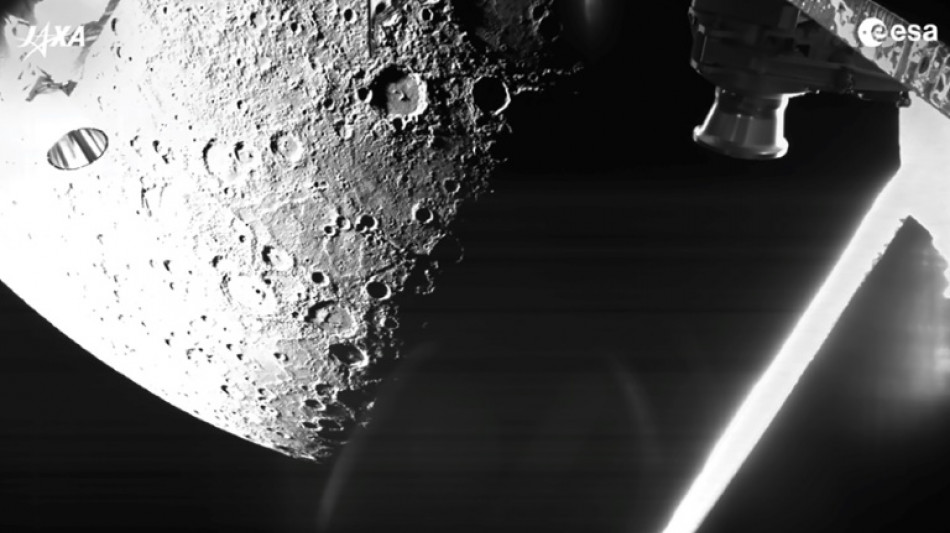
-
 Leftist, far-right candidates go through to Chilean presidential run-off
Leftist, far-right candidates go through to Chilean presidential run-off
-
Zelensky in Paris to seek air defence help for Ukraine

-
 Bangladesh verdict due in ex-PM's crimes against humanity trial
Bangladesh verdict due in ex-PM's crimes against humanity trial
-
A pragmatic communist and a far-right leader: Chile's presidential finalists

-
 England ready for World Cup after perfect campaign
England ready for World Cup after perfect campaign
-
Cervical cancer vaccine push has saved 1.4 million lives: Gavi

-
 World champion Liu wins Skate America women's crown
World champion Liu wins Skate America women's crown
-
Leftist leads Chile presidential poll, faces run-off against far right

-
 Haaland's Norway thump sorry Italy to reach first World Cup since 1998
Haaland's Norway thump sorry Italy to reach first World Cup since 1998
-
Portugal, Norway book spots at 2026 World Cup

-
 Sinner hails 'amazing' ATP Finals triumph over Alcaraz
Sinner hails 'amazing' ATP Finals triumph over Alcaraz
-
UK govt defends plan to limit refugee status

-
 Haaland's Norway thump Italy to qualify for first World Cup since 1998
Haaland's Norway thump Italy to qualify for first World Cup since 1998
-
Sweden's Grant captures LPGA Annika title

-
 Tuchel lays down law to Bellingham after England star's frustration
Tuchel lays down law to Bellingham after England star's frustration
-
Sinner caps eventful year with ATP Finals triumph over great rival Alcaraz

-
 Portugal book spot at 2026 World Cup as England stay perfect
Portugal book spot at 2026 World Cup as England stay perfect
-
Hakimi, Osimhen, Salah shortlisted for top African award

-
 Sinner beats great rival Alcaraz to retain ATP Finals title
Sinner beats great rival Alcaraz to retain ATP Finals title
-
Schenk wins windy Bermuda Championship for first PGA title

-
 Crime, immigration dominate as Chile votes for president
Crime, immigration dominate as Chile votes for president
-
Kane double gives England record-setting finish on road to World Cup

-
 World champions South Africa add Mbonambi, Mchunu to squad
World champions South Africa add Mbonambi, Mchunu to squad
-
Greenpeace says French uranium being sent to Russia

-
 'Now You See Me' sequel steals N. American box office win
'Now You See Me' sequel steals N. American box office win
-
Argentina beat Scotland after frenzied fightback

-
 Argentina beat Scotland after stunning fightback
Argentina beat Scotland after stunning fightback
-
Pope urges leaders not to leave poor behind

-
 Pressure will boost Germany in 'knockout' Slovakia clash, says Nagelsmann
Pressure will boost Germany in 'knockout' Slovakia clash, says Nagelsmann
-
Ecuador votes on hosting foreign bases as Noboa eyes more powers

-
 Portugal qualify for 2026 World Cup by thrashing Armenia
Portugal qualify for 2026 World Cup by thrashing Armenia
-
Greece to supply winter gas to war battered Ukraine

-
 India and Pakistan blind women show spirit of cricket with handshakes
India and Pakistan blind women show spirit of cricket with handshakes
-
Ukraine signs deal with Greece for winter deliveries of US gas

-
 George glad England backed-up haka response with New Zealand win
George glad England backed-up haka response with New Zealand win
-
McIlroy loses playoff but clinches seventh Race to Dubai title

-
 Ecuador votes on reforms as Noboa eyes anti-crime ramp-up
Ecuador votes on reforms as Noboa eyes anti-crime ramp-up
-
Chileans vote in elections dominated by crime, immigration

-
 Turkey seeks to host next COP as co-presidency plans falter
Turkey seeks to host next COP as co-presidency plans falter
-
Bezzecchi claims Valencia MotoGP victory in season-ender
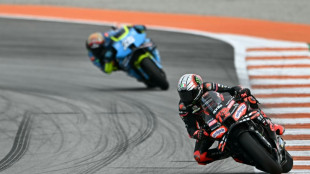
-
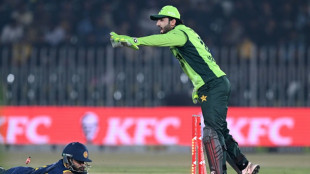 Wasim leads as Pakistan dismiss Sri Lanka for 211 in third ODI
Wasim leads as Pakistan dismiss Sri Lanka for 211 in third ODI
-
Serbia avoiding 'confiscation' of Russian shares in oil firm NIS

-
 Coach Gambhir questions 'technique and temperament' of Indian batters
Coach Gambhir questions 'technique and temperament' of Indian batters
-
Braathen wins Levi slalom for first Brazilian World Cup victory

-
 Rory McIlroy wins seventh Race to Dubai title
Rory McIlroy wins seventh Race to Dubai title
-
Samsung plans $310 bn investment to power AI expansion
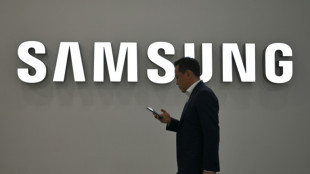
-
 Harmer stars as South Africa stun India in low-scoring Test
Harmer stars as South Africa stun India in low-scoring Test
-
Mitchell ton steers New Zealand to seven-run win in first Windies ODI
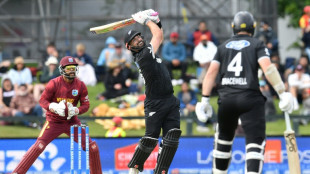
-
 Harmer stars as South Africa bowl out India for 93 to win Test
Harmer stars as South Africa bowl out India for 93 to win Test
-
China authorities approve arrest of ex-abbot of Shaolin Temple


Spacecraft flies closer to Mercury than planned after thruster glitch
A spacecraft carrying European and Japanese probes passed closer to Mercury than originally planned overnight after thruster problems delayed the mission to study the little-known, Sun-scorched planet.
The BepiColombo mission launched in 2018 on a winding path that had been intended to enter the orbit of the planet closest to the Sun in December 2025.
But in April, a glitch with the spacecraft's thrusters sapped some of its power supply, forcing teams on the ground to change its trajectory and delaying its arrival until November 2026.
The new path meant the spacecraft needed to fly 35 kilometres (22 miles) closer to the planet than initially planned -- passing just 165 kilometres above the surface -- during its latest flyby.
The European Space Agency's operations team confirmed that "all went well" with the flyby overnight, the mission's account on X said on Thursday.
It also posted a new image taken by the probe of the planet, whose pockmarked surface resembles the Moon.
It was the fourth of six planned flybys of Mercury on the mission's nine-billion-kilometre journey before it can finally settle into the planet's orbit.
Most of the time Mercury is closer to Earth than Mars -- but the red planet can be reached by missions from Earth in just seven months.
Mercury is "the most difficult" planet for probes to reach, explained Paris Observatory astronomer Alain Doressoundiram.
The planet's relatively tiny mass -- it is only slightly bigger than the Moon -- means its gravitational pull is extremely weak compared to the Sun, making it tricky for satellites to stay in its orbit.
"It takes much more energy to brake and stop at Mercury than to go to Mars," Doressoundiram told AFP.
This is where delicate manoeuvres called gravitational assists come in. These slingshots around celestial bodies allow spacecraft to speed up, slow down, or change trajectory.
The glitch with the electric thrusters means the spacecraft is now operating with only 90 percent of its planned power supply.
After months spent investigating the problem, the thrusters will "remain operating below the minimum thrust required for an insertion into orbit around Mercury in December 2025," mission manager Santa Martinez said in a statement earlier this week.
The new slower path means BepiColombo is now planned to enter orbit in November 2026.
- Space 'oddities' -
Mercury is by far the least studied of the four rocky, innermost planets in our solar system, which also include Venus, Earth and Mars.
NASA's Mariner 10 was the first probe to capture a close picture of its lunar-looking surface in 1974.
No spacecraft had orbited the planet until the MESSENGER probe arrived in 2011.
The NASA mission confirmed "some rather bizarre things," said Doressoundiram, a specialist on the surfaces of planets.
One of these "oddities" is that Mercury is the only rocky planet other than Earth to have a magnetic field, Doressoundiram said. Exactly how it has such a magnetic field so close to the Sun is not fully understood.
Another "oddity" is that Mercury's iron core composes 60 percent of its mass -- compared to only a third for Earth.
Mercury's surface is also marked by "hollows," which could suggest relatively recent geologic activity.
Also unclear is the composition of minerals on covering the planet's surface, which is blasted with intense radiation from the Sun.
These are just some of the mysteries that the BepiColombo mission hopes to shed light on when it finally orbits Mercury for at least a year and a half.
The spacecraft carries two separate satellites, one from the ESA and another from Japan's JAXA space agency, which have a total of 16 scientific instruments.
L.AbuTayeh--SF-PST




